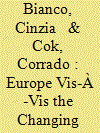| Srl | Item |
| 1 |
ID:
192585


|
|
|
|
|
| Summary/Abstract |
Europe’s relations with the states of the Middle East and North Africa (MENA) are facing a critical juncture. When looking at a regional security architecture, Europe’s overarching interest is stability as it prevents conflict and state vacuums from menacing trade and energy supply routes, creating safe havens for terrorist organizations or hostile powers and fueling refugee flows toward Europe. However, compared to the past, European actors are confronted with a sharply new scenario in MENA that challenges these interests, given a progressive retrenchment of the United States, the rise of China, and MENA actors playing a more assertive role in regional politics and conflicts. The February 2022 Russian invasion of Ukraine is further accelerating these trends. Against this shifting background, MENA countries have intensified efforts to diversify their partnerships with rising global and regional players. European actors still struggle to come to grip with the multipolar scenario in the making—and to design an appropriate strategy to respond.
|
|
|
|
|
|
|
|
|
|
|
|
|
|
|
|
| 2 |
ID:
176542


|
|
|
|
|
| Summary/Abstract |
The systemic shift triggered by a progressive retrenchment of the United States (US) from the wider Middle East region has been a fundamental game changer in the security perceptions of the Gulf Cooperation Council (GCC) monarchies. The retrenchment activated a security dilemma in US-GCC relations, especially in relation to their view of Iran. However, the impact was uneven. While the dilemma triggered fears of abandonment in the three more hawkish players – Saudi Arabia, the UAE and Bahrain –, it generated fears of entrapment in the three less hawkish players – Oman, Kuwait and Qatar. The key differences between these two camps lie on their threat perceptions. Seemingly shaped by state ideology and religion, narratives of identity, socio-political demography and, finally, leadership cognition, these fears interact with domestic factors such as structural vulnerabilities, to affect the perception of Iran as an existential or non-existential risk.
|
|
|
|
|
|
|
|
|
|
|
|
|
|
|
|